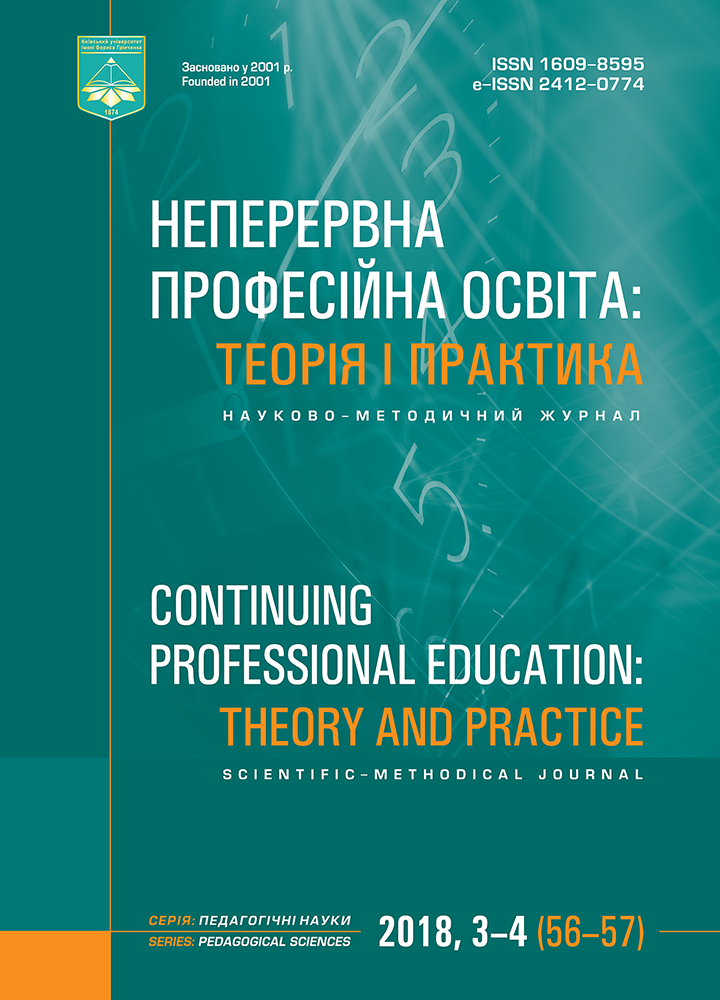TECHNOLOGIES OF HIGHER EDUCATION QUALITY ASSURANCE IN THE CONTEXT OF EUROPEAN PRACTICES
DOI:
https://doi.org/10.28925/1609-8595.2018.3-4.133138Keywords:
European experience in ensuring the quality of higher education, quality of higher education, technology of higher education quality assurance.Abstract
In the article the technologies of higher education quality assurance have been highlighted in the context of modern European practices. The objectivistic, relativistic approaches to ensure the quality of higher education and development concepts have been analyzed. The relationships between these approaches and their inherent features have been characterized. Considering the complexity and multidimensionality of the quality assurance process in higher education, assessments, control, and quality monitoring have been considered.
The features of the quality assurance system, in particular its cyclical nature and focus on improvement, have been pointed out. The systems for assessing the quality of the educational process in the European educational space have been characterized. The objective and relativistic approaches to higher education quality assessment which are customary for Europe have been considered. The emergence of new innovative methods for assessing the quality of education, aimed primarily at improving it, have been noted.
The external and internal evaluation in higher education quality assurance systems have been considered. It has been noted that the external quality assessment system is generally more focused on the understanding of quality associated with standards and cost-effectiveness, and internal - with improvements focused on competitiveness and development. In the context of practice, the implementation of technologies for quality assurance in higher education in Ukraine has been presented.
References
Vitkin, L. M., Volkov, O. I., Himicheva, G. I., Zenkin, A. S. (2006). Systemy yakosti vyshhykh navchalnykh zakladiv: teoriya i praktyka [Systems of quality of higher education: theory and practice]. Kyiv, Ukraine: Naukova dumka (ukr).
Gordon, G. (1998). Approaches to effective internal processes to quality management: an initial analysis. The Tertiary Education and Management, Vol. 4, № 4, 295–301 (eng).
Jacobsson, P. (1990). A plea for more consistent definition of quality in education and research. Quality and communication for improvement: proceedings 12th European AIR Forum, University Claude Bernard Ecole Normale Supйrieure Lyon, France, September 9–12, 1990, Enschede: EAIR, a European Higher Education Society. Utrecht, Netherland: Lemma, 59–84 (eng).
Westerheijden, D. F. (1992). Peers, performance and power: quality assessment in the Netherlands. In L. C. J. Goedegebuure, P. A. M. Maassen, D. F. Westerheijden (Eds.), Peer review and performance indicators: quality assessment in British and Dutch higher education (pp. 183–207). Utrecht, Netherland: Lemma (eng).
Harvey, L. (1997). Quality is not free! Quality monitoring alone will not improve quality. The Tertiary Education and Management, Vol. 3, 2, 133–143 (eng).
Westerheijden, D. F. (1992). Systems of quality assessment in European Higher Education: paper presented to the 4-th EAIE Conference, Berlin, 5–7 November, 1992 (eng).
El-Khawas, E., Thah, T. (1998). Internal review to assure quality: corporative perspectives on evolving practice. The Tertiary Education and Management, Vol. 4, 2, 95–101 (eng).
Geodegebuure, L. C. J., Maassen, P. A. M., Westerheijden, D. F. Quality assessment in higher education. In L. C. J. Goedegebuure, P. A. M. Maassen, D. F. Westerheijden (Eds.), Peer review and performance indicators: quality assessment in British and Dutch higher education (pp. 15–36). Utrecht, Netherland: Lemma, 1992 (eng).
Downloads
How to Cite
Issue
Section
License
Copyright (c) 2020 Nina Batechko, Mykola Lut

This work is licensed under a Creative Commons Attribution-NonCommercial 3.0 Unported License.



